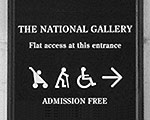 Go to main content
Go to main content
Archive Website of the UK government
Please note that this website has a UK government accesskeys system.
Main menu
Page menu
Disabled people

Tourism and the Equality Act 2010

Under the Equality Act 2010, service providers must make 'reasonable adjustments' to make sure disabled people are not discriminated against. Find out more about service providers responsibilities and what a reasonable adjustment might be.
Service providers' responsibilities
Service providers include providers of:
- holiday accommodation
- tourist attractions
- restaurants
- transport
They cannot refuse to serve you or provide a lower standard of service because of your disability. You must also not be treated unfavourably because of something connected with your disability, unless the treatment can be objectively justified.
Service providers may need to make 'reasonable adjustments' to any barriers that put a disabled person at a substantial disadvantage compared to non-disabled people. This applies when disabled people want to access or use a service provider's service.
What is a reasonable adjustment?
Under the Equality Act 2010, service providers only need to make changes that are 'reasonable'. These might include simple changes to layout, improved signage and information and staff training which can improve accessibility to disabled customers.
It's about what is practical to the service provider's individual situation and what resources they may have. They will not be required to make changes that are impractical or beyond their means.
Examples of reasonable changes that can be made
Examples of reasonable changes that can be made include:
- using large print for registration and guest information
- ensuring that at least one copy of the fixed menu is in Braille
- providing phones with large buttons
- providing portable vibrating alarms for guests who will not be able to hear an audible fire alarm
- where a low reception desk is not available, providing an alternative low desk for wheelchair users
- sending staff on a disability-awareness training course to increase awareness of common disability related issues
Good for business
Making their services more accessible will not only benefit disabled people but could encourage recommendations and return visits. For example:
- the friends, families and any carers accompanying a disabled person
- older customers who may not consider themselves disabled but would appreciate easier access and better facilities
If you believe you have been discriminated against, you might wish to seek advice from the Equality and Human Rights Commission.
Tourism for All website
Tourism for All UK is a charity which offers expertise and support to the tourism and hospitality sector to provide accessible services for all. They also give advice to disabled people about accessible accommodation and other tourism services.
 Facebook
Facebook Twitter
Twitter StumbleUpon
StumbleUpon Delicious
Delicious Reddit
Reddit